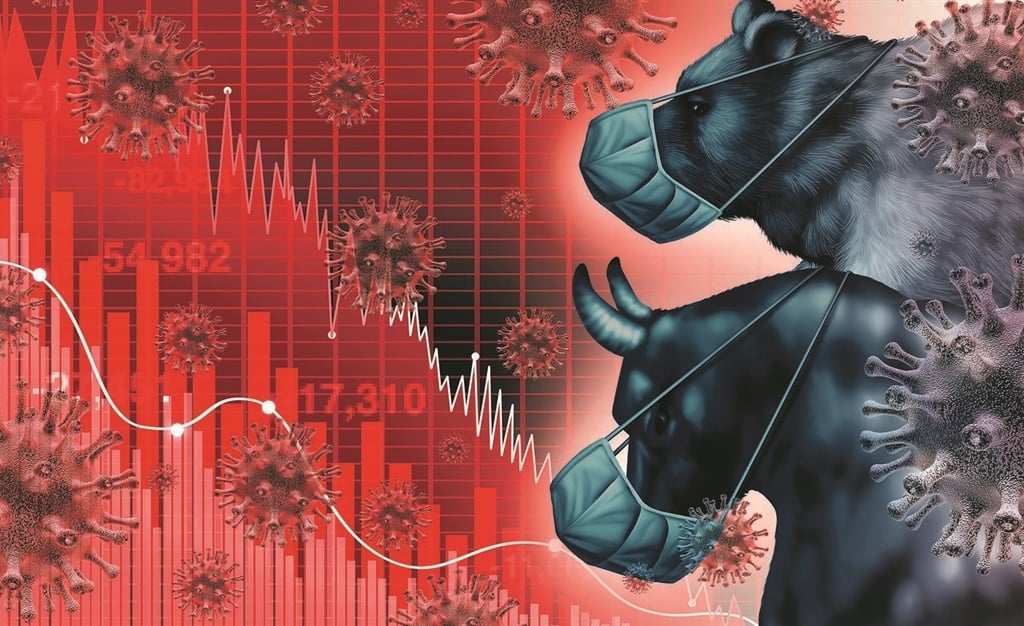
It’s war … a considerable economic contraction and a budget shortfall that is predicted to be the biggest in the history of South Africa is comparable to what the country experienced during wartime, said the SA Reserve Bank this week.
The World Bank this week warned that South Africa’s GDP could contract by eight percentage points.
Professor Raymond Parsons of the North-West University School of Business said that current projections were that the economy could contract by between 5% and 7%, and that 400 000 jobs could be lost.
Annabel Bishop, an economist at Investec, said in a note on Thursday afternoon that a lockdown of one month could result in a contraction of 3% and, should it last for another month, it could be about 6% for the year.
In the Monetary Policy Review, which was published on Monday, the Reserve Bank said that an extension of the lockdown past April 16 means the economy will shrink by more than 4%.
On Thursday, President Cyril Ramaphosa extended the national lockdown until the end of this month.
Reserve Bank governor Lesetja Kganyago said the budget deficit could be more than 10% of the country’s GDP this year.
This is comparable with historic lows of 11.6% during World War 1 in 1914 and 10.4% during World War 2 in 1940.
In the budget that was presented in February, Treasury said it expected a deficit of 6.8% in 2020/21.
Since then, more than 2 000 South Africans have contracted the Covid-19 coronavirus and more than 20 people have died.
Kganyago said it was impossible to make any predictions given the dramatic and constant changes in the world’s economy.
In a report on the regional economy, the World Bank this week said Covid-19 would cost sub-Saharan Africa between $37 billion (R666 billion) and $79 billion in lost production. The region will experience its first recession in 25 years.
According to the Reserve Bank, South Africa’s economy contracted 1.5% during the global financial crisis that began in 2008. However, the comparison is of limited use because South Africa’s fiscal position was so much more favourable at that time.
Parsons said adjustments to the 2020 budget to provide for the present crisis are at about R75 billion, but it looks as if South Africa will need an additional R150 billion.
Read: SA ‘bleeds to death’ as state stays mum on Covid-19 economy plan
This could happen by freezing salary increases in the public sector, withdrawing from the Unemployment Insurance Fund (UIF) and reallocating funds from dysfunctional state-owned enterprises such as SAA.
“It’s time for difficult decisions. A healthy economy and a healthy population are interdependent. If the resources are not sufficient, South Africa must be prepared to obtain them from outside, even from the International Monetary Fund. Now is not the time for ideology, but for pragmatism,” Parsons said.
In their economic overview, which was issued on Thursday, Nedbank economists Johannes Khosa and Nicky Weimar wrote that Asia and Europe were South Africa’s biggest trading partners, collectively representing 61% of total exports and 70% of total imports. Both regions have been hit hard by the pandemic.
Through South Africa’s direct trade relationships, 31% of GDP is exposed to sharp decreases in exports or serious disruptions of supply chains. The secondary effect is reason for even greater concern, and the most damage could come from companies that will be forced to close their doors, subsequent job losses and declining disposable income.
The Reserve Bank’s provisional estimates show that South Africa could lose 370 000 jobs this year and 1 600 businesses could go bankrupt.
The Reserve Bank said the pandemic was a bad start to a new decade after a series of disappointments for South Africa in the 2010s.
This is a reference to the Zuma administration, which was characterised by large-scale corruption and state capture.
According to the Monetary Policy Overview, 2010 to 2020 was the worst decade on record for South African growth (quarterly GDP figures were available from 1960).
Total production from the first quarter of 2010 to the last quarter of last year grew by 15.9%. This compares poorly with difficult decades in the country’s history during the 1980s and 1990s, when production grew by 18.9% and 16.7%, respectively.
The Covid-19 pandemic has also hit South Africa during one of the longest downturns in the business cycle. Historically, downturns last for about 20 months, but the current downturn has already been going on for 74 months, said the Reserve Bank.
The bank warns that measures to soften the impact of the pandemic are needed, but that it is unrealistic for South Africa to institute stimulus measures on the same scale as developed economies.
Parsons agrees.
“South Africa’s vulnerable state finances, as a result of factors including the exorbitant government wage bill and state capture, means government coffers are under pressure. We unnecessarily exposed South Africa to the pain of Covid-19, including through earlier economic mismanagement,” he said.
The SA Chamber of Commerce and Industry (Sacci) suggests a gradual reopening of certain sectors of the economy. This could begin with industries that can show that they are able to ensure physical distancing can be achieved and that they have stringent healthcare measures are in place.
Alan Mukoki, the CEO of Sacci, said that the fast food industry already complied with strict health and safety standards. Additional measures, such as regular Covid-19 testing for employees, can be implemented, and operations can be limited to drive-through counters at first.
According to Parsons, financial aid has to get to the right people. Various small businesses have indicated that if their applications for financial aid are not approved within seven days, they will not be able to survive.
Existing structures such as the UIF should be used more efficiently, rather than spending time setting up new structures, he said.
Nedbank said that all eyes were on the Reserve Bank to lower the interest rate by another 50 or even 100 basis points next month.
 | ||||||||||||||||||||||||||
Get in touchCity Press | ||||||||||||||||||||||||||
| ||||||||||||||||||||||||||
| Rise above the clutter | Choose your news | City Press in your inbox | ||||||||||||||||||||||||||
| City Press is an agenda-setting South African news brand that publishes across platforms. Its flagship print edition is distributed on a Sunday. |




 Publications
Publications
 Partners
Partners








